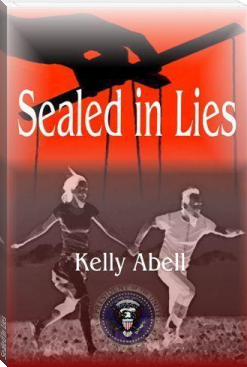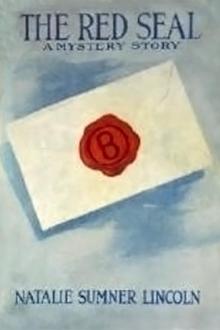R. Holmes & Co. - John Kendrick Bangs (classic books to read TXT) 📗

- Author: John Kendrick Bangs
Book online «R. Holmes & Co. - John Kendrick Bangs (classic books to read TXT) 📗». Author John Kendrick Bangs
"And suppose the incriminating letter is not there?" I asked. "He may have changed his mind."
"I have arranged for that," said Holmes, with a quick, steely glance at me. "I've got a duplicate letter in my pocket now. If he didn't drop it, I will."
But Nervy Jim was honest at least in his desire for a permanent residence in an up-to-date penitentiary, for, even as the deed itself had been accomplished with a precision that was almost automatic, so did the work yet to be done go off with the nicety of a well-regulated schedule. Everything came about as Holmes had predicted, even to the action of the police in endeavoring to fasten the crime upon an inoffensive and somewhat impecunious social dangler, whose only ambition in life was to lead a cotillion well, and whose sole idea of how to get money under false pretences was to make some over-rich old maid believe that he loved her for herself alone and in his heart scorned her wealth. Even he profited by this, since he later sued the editor who printed his picture with the label "A Social Highwayman" for libel, claiming damages of $50,000, and then settled the case out of court for $15,000, spot cash. The letter was found on the floor of the box where Nervy Jim had dropped it; Holmes and his plain-clothes men paid an early visit at the East Houston Street lodging-house, and found the happy Snatcher snoring away in his cot with a smile on his face that seemed to indicate that he was dreaming he was back in a nice comfortable jail once more; and as if to make assurance doubly sure, the missing necklace hung about his swarthy neck! Short work was made of the arrest; Nervy Him, almost embarrassingly grateful, was railroaded to Sing Sing in ten days' time, for fifteen years, and Raffles Holmes had the present pleasure and personal satisfaction of restoring the lost necklace to the fair hands of Mrs. Robinson-Jones herself.
"Look at that, Jenkins!" He said, gleefully, when the thing was all over. "A check for $10,000."
"Well--that isn't so much, considering the value of the necklace," said I.
"That's the funny part of it," laughed Holmes. "Every stone in it was paste, but Mrs. Robinson-Jones never let on for a minute. She paid her little ten thousand rather than have it known."
"Great Heavens!--really?" I said.
"Yes," said Holmes, replacing the check in his pocket-book. "She's almost as nervy as Nervy Jim himself. She's what I call a dead-game sport."
IX THE ADVENTURE OF ROOM 407
Raffles Holmes and I had walked up-town together. It was a beastly cold night, and when we reached the Hotel Powhatan my companion suggested that we stop in for a moment to thaw out our frozen cheeks, and incidentally, warm up the inner man with some one of the spirituous concoctions for which that hostelry is deservedly famous. I naturally acquiesced, and in a moment we sat at one of the small tables in the combination reading-room and cafe of the hotel.
"Queer place, this," said Holmes, gazing about him at the motley company of guests. "It is the gathering place of the noted and the notorious. That handsome six-footer, who has just left the room, is the Reverend Dr. Harkaway, possibly the most eloquent preacher they have in Boston. At the table over in the corner, talking to that gold-haired lady with a roasted pheasant on her head in place of a hat, is Jack McBride, the light-weight champion of the Northwest, and--by thunder, Jenkins, look at that!"
A heavy-browed, sharp-eyed Englishman appeared in the doorway, stood a moment, glanced about him eagerly, and, with a gesture of impatience, turned away and disappeared in the throngs of the corridor without.
"There's something doing to bring 'Lord Baskingford' here," muttered Holmes.
"Lord Baskingford?" said I. "Who's he?"
"He's the most expert diamond lifter in London," answered Holmes. "His appearance on Piccadilly was a signal always to Scotland Yard to wake up, and to the jewellers of Bond Street to lock up. My old daddy used to say that Baskingford could scent a Kohinoor quicker than a hound a fox. I wonder what his game is."
"Is he a real lord?" I asked.
"Real?" laughed Holmes. "Yes--he's a real Lord of the Lifters, if that's what you mean, but if you mean does he belong to the peerage, no. His real name is Bob Hollister. He has served two terms in Pentonville, escaped once from a Russian prison, and is still in the ring. He's never idle, and if he comes to the Powhatan you can gamble your last dollar on it that he has a good, big stake somewhere in the neighborhood. We must look over the list of arrivals."
We finished our drink and settled the score. Holmes sauntered, in leisurely fashion, out into the office, and, leaning easily over the counter, inspected the register.
"Got any real live dukes in the house to-night, Mr. Sommers?" he asked of the clerk.
"Not to-night, Mr. Holmes," laughed the clerk. "We're rather shy on the nobility to-night. The nearest we come to anything worth while in that line is a baronet--Sir Henry Darlington of Dorsetshire, England. We can show you a nice line of Captains of Industry, however."
"Thank you, Sommers," said Holmes, returning the laugh. "I sha'n't trouble you. Fact is, I'm long on Captains of Industry and was just a bit hungry to- night for a dash of the British nobility. Who is Sir Henry Darlington of Dorsetshire, England?"
"You can search me," said the clerk. "I'm too busy to study genealogy--but there's a man here who knows who he is, all right, all right--at least I judge so from his manner."
"Who's that?" asked Holmes.
"Himself," said Sommers, with a chuckle. "Now's your chance to ask him--for there he goes into the Palm Room."
We glanced over in the direction indicated, and again our eyes fell upon the muscular form of "Lord Baskingford."
"Oh!" said Holmes. "Well--he is a pretty fair specimen, isn't he! Little too large for my special purpose, though, Sommers," he added, "so you needn't wrap him up and send him home."
"All right, Mr. Holmes," grinned the clerk. "Come in again some time when we have a few fresh importations in and maybe we can fix you out."
With a swift glance at the open page of the register, Holmes bade the clerk good-night and we walked away.
"Room 407," he said, as we moved along the corridor. "Room 407--we mustn't forget that. His lordship is evidently expecting some one, and I think I'll fool around for a while and see what's in the wind."
A moment or two later we came face to face with the baronet, and watched him as he passed along the great hall, scanning every face in the place, and on to the steps leading down to the barber-shop, which he descended.
"He's anxious, all right," said Holmes, as we sauntered along. "How would you like to take a bite, Jenkins? I'd like to stay here and see this out."
"Very good," said I. "I find it interesting."
So we proceeded towards the Palm Room and sat down to order our repast. Scarcely were we seated when one of the hotel boys, resplendent in brass buttons, strutted through between the tables, calling aloud in a shrill voice:
"Telegram for four-oh-seven. Four hundred and seven, telegram."
"That's the number, Raffles," I whispered, excitedly.
"I know it," he said, quietly. "Give him another chance--"
"Telegram for number four hundred and seven," called the buttons.
"Here, boy," said Holmes, nerving himself up. "Give me that."
"Four hundred and seven, sir?" asked the boy.
"Certainly," said Holmes, coolly. "Hand it over--any charge?"
"No, sir," said the boy, giving Raffles the yellow covered message.
"Thank you," said Holmes, tearing the flap open carelessly as the boy departed.
And just then the fictitious baronet entered the room, and, as Holmes read his telegram, passed by us, still apparently in search of the unattainable, little dreaming how close at hand was the explanation of his troubles. I was on the edge of nervous prostration, but Holmes never turned a hair, and, save for a slight tremor of his hand, no one would have even guessed that there was anything in the wind. Sir Henry Darlington took a seat in the far corner of the room.
"That accounts for his uneasiness," said Holmes, tossing the telegram across the table.
I read: "Slight delay. Will meet you at eight with the goods." The message was signed: "Cato."
"Let's see," said Holmes. It is now six-forty-five. Here--lend me your fountain-pen, Jenkins.
I produced the desired article and Holmes, in an admirably feigned hand, added to the message the words: "at the Abbey, Lafayette Boulevard. Safer," restored it in amended form to its envelope.
"Call one of the bell-boys, please," he said to the waiter.
A moment later, a second buttons appeared.
"This isn't for me, boy," said Holmes, handing the message back to him. "Better take it to the office."
"Very good, sir," said the lad, and off he went.
A few minutes after this incident, Sir Henry again rose impatiently and left the room, and, at a proper distance to the rear, Holmes followed him. Darlington stopped at the desk, and, observing the telegram in his box, called for it and opened it. His face flushed as he tore it into scraps and made for the elevator, into which he disappeared.
"He's nibbling the bait all right," said Holmes, gleefully. "We'll just wait around here until he starts, and then we'll see what we can do with Cato. This is quite an adventure."
"What do you suppose it's all about?" I asked.
"I don't know any more than you do, Jenkins," said Holmes, "save this, that old Bob Hollister isn't playing penny-ante. When he goes on to a job as elaborately as all this, you can bet your last dollar that the game runs into five figures, and, like a loyal subject of his Gracious Majesty King Edward VII, whom may the Lord save, he reckons not in dollars but in pounds sterling."
"Who can Cato be, I wonder?" I asked.
"We'll know at eight o'clock," said Holmes. "I intend to have him up."
"Up? Up where?" I asked.
"In Darlington's rooms--where else?" demanded Holmes.
"In four hundred and seven?" I gasped.
"Certainly--that's our headquarters, isn't it?" he grinned.
"Now see here, Raffles," I began.
"Shut up Jenkins," he answered. "Just hang on to your nerve--"
"But suppose Darlington turns up?"
"My dear boy, the Abbey is six miles from here and he won't by any living chance, get back before ten o'clock to-night. We shall have a good two hours and a half to do up old Cato without any interference from him," said Holmes. "Suppose he does come--what then? I rather doubt if Sir Henry Darlington, of the Hotel Powhatan, New York, or Dorsetshire, England, would find it altogether pleasant to hear a few reminiscences of Bob Hollister of Pentonville prison, which I have on tap."
"He'll kick up the deuce of a row," I protested.
"Very doubtful, Jenkins," said Raffles. "I sort of believe he'll be as gentle as a lamb when he





Comments (0)